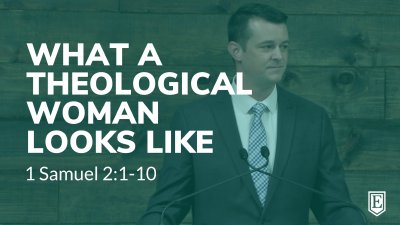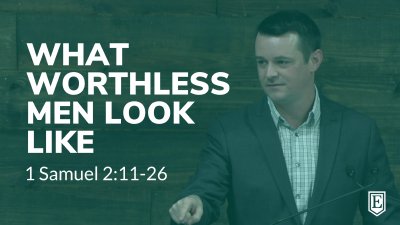WHAT WORTHLESS MEN LOOK LIKE: 1 Samuel 2:11-26
September 11, 2022 • Brett Baggett • 1 Samuel 2:11–26
I. Worthless men may know about the Lord, but they do not know the Lord (1 Samuel 2:12b).
II. Worthless men create customs according to their own desires rather than submitting to the Law of the Lord (1 Samuel 2:13-14).
III. Worthless men insist on their own way and hate reproof (1 Samuel 2:15-16).
IV. Worthless men disrespect the sacrifice of the Lord (1 Samuel 2:17).
V. Worthless men use women, rather than honor them for the Lord’s glory and their good (1 Samuel 2:22).
VI. Worthless men may find themselves eventually handed over to hardness of heart and to destruction (1 Samuel 2:25).
INTRODUCTION: All of Scripture is profitable. This passage of Scripture, 1 Samuel 2:11-26, is profitable as a negative example. It is helpful in seeing what to avoid.
CONTEXT: Look at 1 Samuel 2:11-12a: “Then Elkanah went home to Ramah. And the boy was ministering to the LORD in the presence of Eli the priest. Now the sons of Eli were worthless men.”
In this chapter, the sons of Eli are the main focus but the writer keeps interjecting little summaries about the boy Samuel, whom God is going to raise up as a Prophet and Judge for His people. You have seen it already in verses 11-12, but look at verse 18: “Samuel was ministering before the Lord, a boy clothed with a linen ephod.” Now look at the end of verse 21: “And the boy Samuel grew in the presence of the Lord.” Look again at verse 26: “Now the boy Samuel continued to grow both in stature and in favor with the Lord and also with man.” We are meant to compare and contrast the worthless sons of Eli with the godly boy Samuel. Lord willing we will focus on the sons of Eli today, Samuel next Lord’s Day, and Eli the week after that.
BIG IDEA: What worthless men look like.
MEN, these are the character traits and actions you and I are to watch out for in ourselves and repent of if any of these hit close to home. Even in Christ, the old man still rages in your flesh for now. You will see a worthless man inside of your chest until your glorification, therefore you must put him continually to death. If these marks of Worthless Men hit you, men, I) Flee to Christ and Him crucified for the forgiveness of sins and cleansing through His blood, and II) Run to to God in praying, petitioning Him for help, so that you may put these worthless ways to death by the Spirit.
GIRLS, YOUNG WOMEN, AND UNMARRIED WOMEN, these are the character traits and actions of men who are not worth your time. Avoid these kinds of men.
BOYS AND YOUNG MEN, these sons of Eli are worthless men—you should not want to be like them. Learn from them how not to act.
MARRIED WOMEN, if you find yourself married to a worthless man, pray. Pray and continue to serve the Lord faithfully, and may the Lord God mercifully change his heart.
Why does this matter? Because eternal life and death is at stake. Worthless men, if they do not repent and go to Christ in faith, will be put to death by the Lord and suffer under his righteous judgement and wrath forever in hell. On their way to hell, worthless men falsely portray Christ, pervert the worship of God, disrespect Christ crucified, use women, and dishonor their parents, wreaking havoc on all who are around them.
I. WORTHLESS MEN MAY KNOW ABOUT THE LORD, BUT THEY DO NOT KNOW THE LORD (1 Samuel 2:12b). “They did not know the LORD.” Almost every time God points out a worthless man in the Scriptures, they are professed believers. Why? Because the worst kind of wicked man is the kind who professes to be righteous. The worst kind of worthless man is the one who outwardly seems to serve the Lord but inwardly serves himself. The worst kind of fruit is the kind that looks delightful to the eyes but inside it is full of maggots. Take notice: Worthless men, like the sons of Eli, may know about the Lord, they may even be ministers, but they do not know the Lord. They may be able to speak about the light, but their is no light in them.
A worthless man may be able to tell you every petition of the Lord’s Prayer, but he does not want to pray himself because he does not love the Lord nor think he needs His mercy. A worthless man may be able to tell you every one of the Ten Commandments, but he does not want to obey a single one of them out of love for God, because he does not know the Lord. A worthless man may be able to tell you all there is to know from the Scriptures about God the Father, God the Son, and God the Holy Spirit, but he has no child-like love for the Father, no trust in Christ’s righteousness and sacrifice, no sealing or strength from the Holy Spirit because he knows about the Lord but does not know the Lord by grace through faith. A worthless man may be knowledgeable in the doctrines of the gospel, but he does not rest in those promises; they may know of Christ’s passive and active obedience, but they are not clothed in His righteousness nor forgiven of their sin by faith in Him; they may know of the reliability of Christ’s resurrection, but they have no resurrection power in them; they may know of Christ’ ascension, but He is not their Advocate; they may know of Christ’s conquering of the nations through His gospel, but they do not submit to His merciful rule; they may know of Christ’s eminent return to judge the living and the dead, but that day will be a sad day for them.
Are you like a worthless man in this regard? Experience must never be divorced from knowledge, but knowledge also must never be divorced from experience.
USE THIS TRUTH FOR INSTRUCTION: It is not enough to know about the Lord! You must come to know the Lord personally by faith in Jesus Christ. You must not only know of God the Father; you must be adopted by Him and know Him as your Father through Christ. You cannot merely know Christ is the Savior and King; you must come to know Him by trusting Him as your Savior and submitting to Him as your King. You need to make sure you do not settle for knowing about what God the Holy Spirit does and does not do; you need to press on to know by experience who God the Holy Spirit in His sealing, strengthening, sustaining, savoring, and fruit-bringing grace. Worthless men may know about the Lord, but godly men and women and boys and girls know the Lord God Himself by faith in Christ Jesus, and they press on to know Him more in all of His excellencies.
USE THIS TRUTH FOR EXHORTATION: You and I must press on to commune with God through prayer, reading the Word, hearing the Word, the Lord’s Supper, Christian fellowship, obedience, grateful worship, and all the other ordinary means of grace! Labor and pray to get a heart like the Bride in Song of Solomon, who says, “The voice of my beloved! Behold, he comes, leaping over the mountains, bounding over the hills” (Song. 2:8).
II. WORTHLESS MEN CREATE CUSTOMS ACCORDING TO THEIR OWN DESIRES RATHER THAN SUBMITTING TO THE LAW OF THE LORD (1 Samuel 2:13-14). “The custom of the priests with the people was that when any man offered sacrifice, the priest's servant would come, while the meat was boiling, with a three-pronged fork in his hand, and he would thrust it into the pan or kettle or cauldron or pot. All that the fork brought up the priest would take for himself. This is what they did at Shiloh to all the Israelites who came there.” “There was no such rule or regulation given by God; but these sons of Eli had made rules for themselves” (Charles Spurgeon). Worthless men turn off the pure light of God’s commandments, so that they may be in the darkness of their own desires.
Christ, in His earthly ministry, encountered worthless men and he speaks about them in Matthew 15:6-9: Christ says to them, “For the sake of your tradition you have made void the word of God. You hypocrites! Well did Isaiah prophesy of you, when he said: ‘This people honors me with their lips, but their heart is far from me; in vain do they worship me, teaching as doctrines the commandments of men.’” Do you have traditions or customs in your own life that are, in reality, in opposition to the Law of God?
Paul encountered worthless men, and he speaks of them in Philippians 3:18-19: “For many, of whom I have often told you and now tell you even with tears, walk as enemies of the cross of Christ. Their end is destruction, their god is their belly, and they glory in their shame, with minds set on earthly things.” Is your god your belly? Do you glory in your shame? Is your mind set on earthly things?
Worthless men create customs and traditions according to their own desires, but godly men and women and boys and girls try their best to submit to the perfect commandments and desires of the Lord. The godly want to submit to Christ Jesus, because He loves us and gave Himself up for the us the cross! “[Christ] died for all, that those who live might no longer live for themselves but for him who for their sake died and was raised” (2 Cor. 5:15).
III. WORTHLESS MEN INSIST ON THEIR OWN WAY, AND HATE REPOOF (1 Samuel 2:15-16). “Moreover, before the fat was burned, the priest's servant would come and say to the man who was sacrificing, ‘Give meat for the priest to roast, for he will not accept boiled meat from you but only raw.’ And if the man said to him, ‘Let them burn the fat first, and then take as much as you wish,’ he would say, ‘No, you must give it now, and if not, I will take it by force.’” This is not love for God nor love for neighbor. “Love does not insist on its own way” (1 Cor. 13:5). The sons of Eli should have rejoiced at the reproof of the worshippers, who said, “Let them burn the fat first” (1 Sam. 2:16), but they hated reproof and continued to insist on their own way, further revealing their worthlessness and stupidity. “Whoever loves discipline loves knowledge, but he who hates reproof is stupid” (Prov. 12:1). Worthless men hate reproof and knowledge because they are wise in their own eyes, like a blind man who hates the idea of seeing because he thinks it better to be ignorant and stumbling. Worthless men insist on their own way and hate reproof, but godly men and women and boys and girls insist on the Lord’s way. When the godly hear reproof, though it may sting, they love discipline so that they may live holy lives for God’s glory. How about you? Do you insist on your own way? Do you hate reproof? Remember how the sons of Eli end up because they insisted on their own way and would not listen when the people corrected them.
IV. WORTHLESS MEN DISRESPECT THE SACRIFICE OF THE LORD (1 Sam. 2:17). “Thus the sin of the young men was very great in the sight of the LORD, for the men treated the offering of the LORD with contempt.” All the sacrifices were shadows of Christ and him crucified, they all pointed to the Savior. The sons of Eli disrespected the sacrifices of shadow, and their sin was very great in the eyes of the LORD. Since God hated their disrespecting of the shadow of Christ’s sacrifice, what do you think he thinks of you and I if we disrespect the body of Christ’s sacrifice? “Anyone who has set aside the law of Moses dies without mercy on the evidence of two or three witnesses. How much worse punishment, do you think, will be deserved by the one who has trampled underfoot the Son of God, and has profaned the blood of the covenant by which he was sanctified, and has outraged the Spirit of grace? For we know him who said, ‘Vengeance is mine; I will repay.’ And again, ‘The Lord will judge his people.’ It is a fearful thing to fall into the hands of the living God” (Heb. 10:28-31).
USE THIS TRUTH FOR EXAMINATION. Do you disrespect the cross of Christ or do you strive to glory in Christ crucified for sinners like you and me? Do you take your sin lightly because you think something like, “It is not a big deal! Jesus died for sinners, so I can never be condemned for this that I am about to do”? Thomas Watson rightly said, “To sin because mercy abounds is the devil’s logic.”
One way to see if you disrespect the offering of the Lord is to examine how you treat the Lord’s Supper. Do you examine yourself before coming? Do you confess and repent of any known sin? Do you think about Christ crucified and exercise faith in Him? Do you delight to partake of the bread and the cup because Christ instituted this for our good and His glory? Do you rejoice that we get to proclaim Christ’s death in this way? Worthless men disrespect the sacrifice of the Lord, but godly men and women and boys and girls boast in nothing but Christ and Him crucified! Because Christ and Him crucified is our only hope and our greatest joy!
V. WORTHLESS MEN USE WOMEN, RATHER THAN HONOR THEM FOR THE LORD’S GLORY AND THEIR GOOD (1 Sam. 2:22). “Now Eli was very old, and he kept hearing all that his sons were doing to all Israel, and how they lay with the women who were serving at the entrance to the tent of meeting.” QUESTION. How do worthless men use women? ANSWER. Some worthless men use women physically, some mentally, some emotionally. Worthless men use women, but godly men honor them for the Lord’s glory and their good. How about you?
VI. WORTHLESS MEN MAY FIND THEMSELVES EVENTUALLY HANDED OVER TO HARDNESS OF HEART AND TO DESTRUCTION (1 Sam. 2:25). “If someone sins against a man, God will mediate for him, but if someone sins against the LORD, who can intercede for him?” But they would not listen to the voice of their father, for it was the will of the LORD to put them to death.” “They had gone so far in their sin that the Lord permitted them to go further still, and to bring punishment upon themselves for their evil deeds” (Charles Spurgeon). “For although they knew God, they did not honor him as God or give thanks to him, but they became futile in their thinking, and their foolish hearts were darkened. . . Therefore God gave them up” (Rom. 1:21, 24). Worthless men harden their heart against God, and there comes a point when God Himself will give them what they want and complete the hardening. It is a fearful thing for God to give the ungodly what they want! Fearful, but just.
USE THIS TRUTH FOR WARNING. If you reject Christ today, you may never get another chance. If you harden your heart against the Lord, He may give you what you want and complete the hardening. Go to Christ today! Repent. Trust Christ. Submit to Him. Be baptized. Become a part of the Church. Look at the sons of Eli in 1 Samuel 2:11-26 and let that warn you to flee to Christ before it is too late.
USE THIS TRUTH, BELIEVER, FOR COMFORT. Look at the first part of verse 25 again. Know this and be comforted: If you are united to Christ by faith in Him, you have a better priest than Eli! You have the perfect God-man, the Son of God Himself, as your High Priest who makes peace between you and God. “Who shall bring any charge against God's elect? It is God who justifies. Who is to condemn? Christ Jesus is the one who died—more than that, who was raised—who is at the right hand of God, who indeed is interceding for us. Who shall separate us from the love of Christ?” (Rom. 8:33-35).
USE THIS TRUTH, CHRISTIAN, FOR THANKSGIVING. Look again at the end of verse 25: “it was the will of the LORD to put them to death.” This is what I deserve. This is what you deserve. But now, belonging to Christ, we know this not what we received from the Lord. “God has not destined us for wrath, but to obtain salvation through our Lord Jesus Christ” (1 Thess. 5:9). Beloved, the sons of Eli could never again repent, but you and I who believe can never again fall away.
No matter what you are suffering, if you belong to Christ, “God has not destined you for wrath, but to obtain salvation through Jesus Christ” (1 Thess. 5:9).
Oh how thankful we believers should be that God did not hand us over to our worthlessness, but made us alive together with Christ for now and eternity! If you are not united to Christ, repent, believe, be baptized. If you are in Christ, show your thankfulness now in holy worship, feasting, and fellowship!








